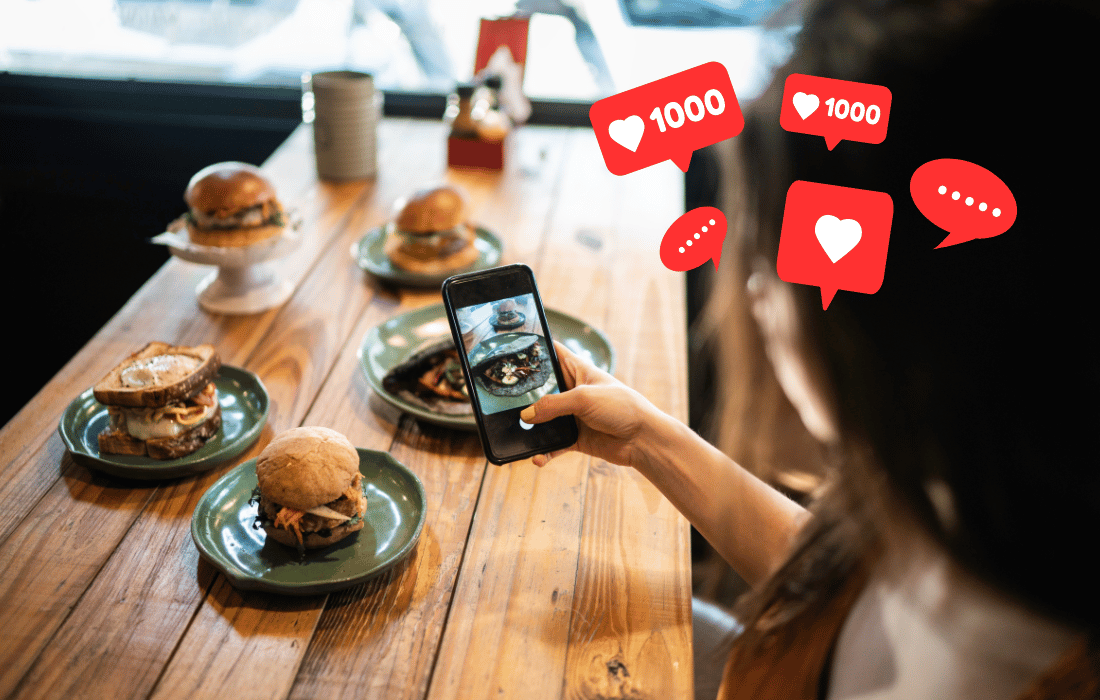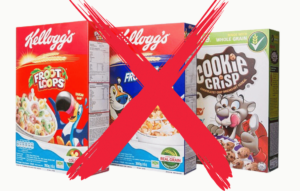In today’s digital age, where social media influencers, athletes, and celebrities hold unprecedented power, it’s no wonder that big food and fast food companies have tapped into this influence to market their products. The result? A dangerously deceptive trend that promotes unhealthy foods under the guise of trust and admiration. This article explores the troubling practice of using celebrities to endorse junk food, the impact of these endorsements on public health, and why it’s crucial for individuals to become their own health advocates.
The Power of Celebrity Influence in Marketing
Celebrity endorsements have been a marketing staple for decades, from Michael Jordan’s iconic partnership with Gatorade to Beyoncé’s collaboration with Pepsi. These partnerships are more than just clever marketing—they’re psychological tools designed to exploit our trust in public figures. Research has shown that when a celebrity endorses a product, it can create a “halo effect,” where the positive qualities of the celebrity are transferred to the product in the consumer’s mind. This powerful influence can significantly drive sales and brand loyalty, often to the detriment of public health.
 Consider the case of Travis Scott’s collaboration with McDonald’s. The “Travis Scott Meal,” a combination of a Quarter Pounder with cheese, bacon, lettuce, medium fries, BBQ sauce, and a Sprite, became an instant hit. The promotion was so successful that it led to widespread ingredient shortages across McDonald’s locations. However, while the campaign was a financial boon for both the fast food chain and Scott, it also set a troubling precedent by glorifying a high-calorie, nutrient-poor meal as something to be celebrated and emulated, particularly among younger, impressionable audiences.
Consider the case of Travis Scott’s collaboration with McDonald’s. The “Travis Scott Meal,” a combination of a Quarter Pounder with cheese, bacon, lettuce, medium fries, BBQ sauce, and a Sprite, became an instant hit. The promotion was so successful that it led to widespread ingredient shortages across McDonald’s locations. However, while the campaign was a financial boon for both the fast food chain and Scott, it also set a troubling precedent by glorifying a high-calorie, nutrient-poor meal as something to be celebrated and emulated, particularly among younger, impressionable audiences.
The implications of such partnerships go beyond mere sales. They shape consumer behavior, normalizing the consumption of unhealthy foods as part of a lifestyle that is not only acceptable but desirable. The allure of eating what your favorite celebrity eats is powerful, but it is also dangerous, as it often leads to the adoption of poor dietary habits that contribute to long-term health issues.
The Dark Side of Celebrity Endorsements
While celebrity endorsements can make a product appear more appealing, they often mask the unhealthy reality of the foods being promoted. Celebrities, with their access to personal trainers, dietitians, and other health resources, can afford to indulge in these foods without significant consequences. The general public, however, is not afforded the same luxury. When a celebrity promotes a sugary cereal, a fast food meal, or a soda, it sends a misleading message that these foods are not only safe but also desirable to consume regularly.
This issue is particularly concerning when it comes to children and adolescents, who are among the most vulnerable to the influence of celebrity endorsements. A study by NYU Langone found that a staggering 81% of food products endorsed by music celebrities were “nutrient-poor,” and 71% of the beverages they promoted were sugary drinks. These are the same celebrities who are role models for millions of young people, many of whom are already struggling with issues related to weight, body image, and self-esteem.
Truthfully, “nutrient-poor and sugary” are the least of my worries. These foods are loaded with ultra-processed forever chemicals that are causing the United States to be the sickest country in the world.
The consequences of these endorsements are severe. With childhood obesity rates on the rise and diet-related diseases becoming increasingly common among younger populations, the promotion of unhealthy foods by trusted figures is contributing to a public health crisis. Yet, the responsibility for this crisis is often shifted away from the food companies and onto individuals, further complicating efforts to address these issues at a societal level.
The Exploitation of the Anti-Diet Movement

The anti-diet movement, which advocates for body positivity, intuitive eating, and the idea that people can be healthy at any size, emerged as a response to the harmful effects of diet culture. It aimed to challenge the stigmatization of larger bodies and promote mental and physical well-being over weight loss. This dangerous, lazy, and misleading approach to “nutrition” has also been co-opted by big food companies eager to capitalize on its popularity.
General Mills, for instance, has been a key player in this exploitation. By partnering with dietitians and influencers who promote anti-diet messages, the company has been able to market its sugary cereals and snacks as part of a healthy, guilt-free lifestyle. These influencers often share posts with hashtags like #NoBadFoods and #FoodFreedom, suggesting that it’s okay to indulge in processed foods without feeling guilty. But what these posts don’t mention is the long-term impact of regularly consuming these products.
In a particularly egregious example, General Mills funded a study claiming that food shaming leads to mental health issues and social isolation. The company then used the results of this study to argue against federal regulations that would require more transparent labeling of unhealthy ingredients on food packaging. By positioning itself as a champion of mental health and body positivity, General Mills cleverly obscures its true agenda: to sell more processed, sugary foods.
This manipulation of the anti-diet movement not only undermines the movement’s original goals but also perpetuates the cycle of unhealthy eating habits. By framing indulgence in unhealthy foods as a form of self-care or empowerment, big food companies are effectively encouraging consumers to ignore the health risks associated with their products.
The Infuriating Threat of Anti-Diet Culture
While I fully acknowledge that diet culture can be unhelpful—often pushing unrealistic standards and leading to harmful behaviors—I believe there is a much more insidious danger in the rise of anti-diet culture. Yes, fat-shaming is wrong, and we should never belittle anyone for their weight. However, promoting the idea that it’s perfectly okay to be obese, to consume foods that make you sick, fat, and eventually lead to life-threatening conditions, is not just misguided—it’s criminally insane.
I’m all about balance. Do I eat perfectly? Absolutely not. But there are certain foods I refuse to touch—fast foods, ultra-processed items filled with forever chemicals and toxins that are nearly impossible to detox from the body. These aren’t just minor concerns; they’re serious risks, especially for those who are already overweight. For someone struggling with their weight, these foods shouldn’t even be an option, let alone something to be celebrated as anti-diet culture suggests.
I have friends who struggle with their weight, and let me be clear: I don’t shame them. I stand beside them, offering support, encouragement, and the motivation to make healthier choices. Why? Because I love them, and because I know that condoning the lifestyle promoted by anti-diet culture is not an act of kindness—it’s a disservice that puts their health at greater risk.
It infuriates me to see influencers, celebrities, and so-called “dietitians” pushing this dangerous narrative. It’s one thing to reject harmful aspects of diet culture, but it’s another thing entirely to promote behaviors that can seriously harm people who are already at major risk. The stakes are too high to sit back and say nothing.
The Role of Social Media Influencers in Spreading Misinformation
Social media influencers have become some of the most powerful marketing tools in the food industry. With their massive followings and the ability to create relatable, engaging content, they can make a product go viral with just one post. However, while some influencers are transparent about their partnerships, others blur the lines between genuine recommendations and paid endorsements, often leading to the spread of misinformation.
For instance, TikTok star Charli D’Amelio’s partnership with Dunkin’ Donuts, which resulted in the launch of “The Charli,” a sugary coffee drink, quickly became the chain’s most successful product launch ever. While D’Amelio was open about the partnership, the larger issue is that these types of promotions normalize the consumption of high-sugar, high-calorie products, especially among her young audience, who may not fully understand the health implications.
Similarly, anti-diet dietitian Cara Harbstreet has promoted General Mills cereals using the slogan #DerailTheShame, encouraging her followers to enjoy these foods without guilt. While the message is about enjoying food without shame, it’s crucial to remember that cereals like Cinnamon Toast Crunch and Cocoa Puffs are far from nutritious. They are loaded with sugar and offer little nutritional value. Yet, by aligning these products with a positive, anti-diet message, Harbstreet and others like her inadvertently promote unhealthy eating habits.
The problem with these endorsements is not just the promotion of specific products but the broader message they send about food and health. By suggesting that all foods are equally valid choices, influencers and celebrities contribute to a culture where critical thinking about nutrition is discouraged. This can lead to a lack of awareness about the health risks associated with certain foods and a greater susceptibility to diet-related diseases.
The Need for Critical Thinking and Personal Responsibility
Given the overwhelming influence of celebrities and influencers, it can be challenging to navigate the world of food marketing. However, it’s more important than ever for individuals to take responsibility for their health by doing their own research and making informed decisions about what they eat.
One of the biggest challenges in today’s food environment is the sheer amount of conflicting information. On one hand, we’re bombarded with messages about the importance of eating whole, unprocessed foods, while on the other, we’re told that it’s okay to indulge in sugary snacks and fast food as part of a balanced diet. Navigating this landscape requires critical thinking and a willingness to question the messages we receive from celebrities, influencers, and even health professionals.
It’s easy to be swayed by a well-crafted ad or a glowing endorsement from a favorite star, but it’s crucial to remember that celebrities are paid to promote these products. They might not actually use or even like what they’re selling. Their primary motivation is financial, not your health.
Moreover, it’s important to recognize that doing your own research is not dangerous—it’s empowering. The idea that only experts or authorities should be trusted when it comes to health information is not only outdated but also potentially harmful. During the COVID-19 pandemic, we saw how dangerous it can be when people are discouraged from seeking out information and asking questions. The same principle applies to food and nutrition.
The Role of Education in Combating Deceptive Marketing
One of the most effective ways to combat the deceptive marketing tactics of big food companies is through education. By teaching individuals, particularly children and adolescents, about nutrition and the impact of diet on health, we can empower them to make better choices and resist the allure of celebrity-endorsed junk food.
 Nutrition education should be a fundamental part of the curriculum in schools, with a focus on critical thinking and media literacy. Students should learn how to read food labels, understand the ingredients in their food, and recognize the tactics used by marketers to sell unhealthy products. They should also be encouraged to question the messages they receive from celebrities and influencers and to make decisions based on their own research and understanding.
Nutrition education should be a fundamental part of the curriculum in schools, with a focus on critical thinking and media literacy. Students should learn how to read food labels, understand the ingredients in their food, and recognize the tactics used by marketers to sell unhealthy products. They should also be encouraged to question the messages they receive from celebrities and influencers and to make decisions based on their own research and understanding.
Parents also play a crucial role in educating their children about healthy eating. By modeling good eating habits and encouraging their children to be critical of the marketing messages they encounter, parents can help set the foundation for a lifetime of healthy choices. This includes having open conversations about the role of celebrities in marketing and explaining why not everything a celebrity promotes is good for them.
The Call to Action: Becoming Your Own Health Advocate
In a world where celebrity endorsements can easily sway public opinion, it’s essential to become your own health advocate. This means taking the time to research what you’re eating, asking questions, and making informed decisions about your diet. It also means being skeptical of the messages you receive from celebrities and influencers and recognizing that their endorsements are often driven by financial incentives rather than a genuine concern for your health.
This doesn’t mean you have to give up all indulgences or never enjoy a treat. But it does mean being mindful of how often you’re consuming processed, sugary, or calorie-dense foods, and understanding the potential impact on your health. By doing so, you can take control of your health and avoid falling into the trap of unhealthy eating habits promoted by big food companies.
Moreover, it’s important to remember that your health is your responsibility. No one else knows your body, your lifestyle, and your needs better than you do. By taking the time to research what you’re eating, you can make informed decisions that support your long-term health and well-being.
The Importance of Consumer Advocacy and Policy Change
While individual responsibility is crucial, it’s also important to recognize the role of consumer advocacy and policy change in addressing the issue of celebrity-endorsed junk food. Consumers have the power to demand better from both food companies and celebrities and to push for policies that promote transparency and accountability in food marketing.
One important step is to hold celebrities and influencers accountable for the products they endorse. By calling out endorsements that are clearly at odds with a celebrity’s public image or values, consumers can send a message that they won’t be fooled by misleading marketing tactics. This can also encourage celebrities to be more selective about the products they promote and to use their influence for good.
Finally, I will always preach that you should vote with your dollar. Consumers can support organizations and movements that advocate for healthier food environments and stronger transparency in food marketing. By working together, we can create a food system that prioritizes public health over profits and empowers individuals to make the best choices for themselves and their families.
Conclusion: The Power of Informed Choices
In closing, while celebrity endorsements and influencer marketing are powerful tools for selling products, they are hardly ever in the best interest of public health. By being critical of the messages we receive and taking responsibility for our own health, we can resist the allure of celebrity-endorsed junk food and make informed choices that support our long-term well-being.
It’s time to recognize the dangers of blindly trusting celebrity endorsements and to take control of our own health. By doing our own research, questioning the status quo, and advocating for healthier food environments, we can protect ourselves and future generations from the harmful effects of deceptive marketing. Remember, it’s not dangerous to do your research—it’s dangerous to leave your health in the hands of those who prioritize profits over your well-being.







